CNC machining services forUSA
Submit your order for premium custom parts
CY's CNC machining services, in USA , makes quality parts for your requiements.

Welcome to DongGuan ChengYang, your premier provider of CNC machining services for Idaho. With years of experience, state-of-the-art technology, and a dedicated team of skilled professionals, we are committed to delivering high-quality machining solutions to meet your specific needs. Whether you require precision parts for aerospace, automotive, medical, or any other industry, we have the expertise and capabilities to exceed your expectations.
Our CNC machining services for Idaho encompass a wide range of processes, including milling, turning, drilling, and more. We use advanced equipment and cutting-edge software to ensure accuracy, reliability, and efficiency in every project. From prototype development to mass production, we can handle projects of any size and complexity with precision and attention to detail.
At DongGuan ChengYang, customer satisfaction is our top priority. We work closely with our clients to understand their requirements, provide personalized solutions, and deliver results that meet and exceed their expectations. Trust us for all your CNC machining needs in Idaho, and let us help you achieve success in your projects.
CNC Machining services
Dongguan Chengyang brings together the power of 3-axis, 4-axis, and 5-axis CNC milling machines, provides us to proficiently processing part ranging from plain to elaborate .
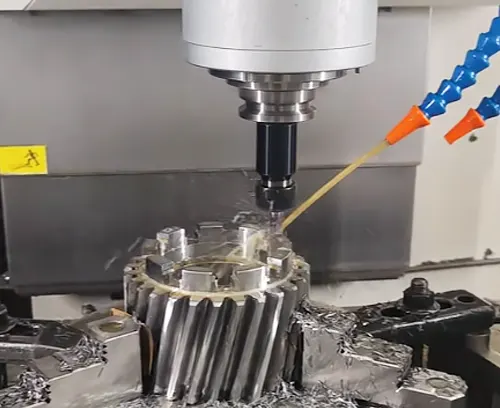
CNC Milling
Our shop features CNC milling capabilities, ensuring top-quality components are delivered with speed and accuracy.
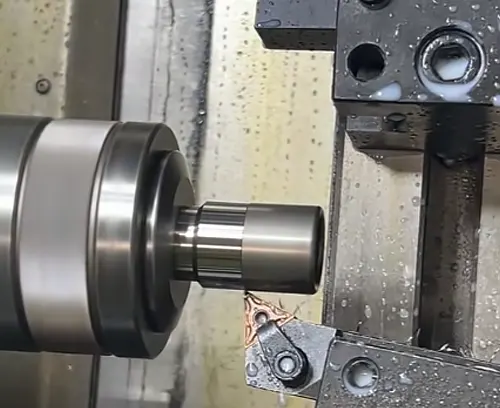
CNC Turnning
Our CNC lathes, turning centers, and mill-turn equipment enable us withefficiency to construct a broad range of parts for every consumer.
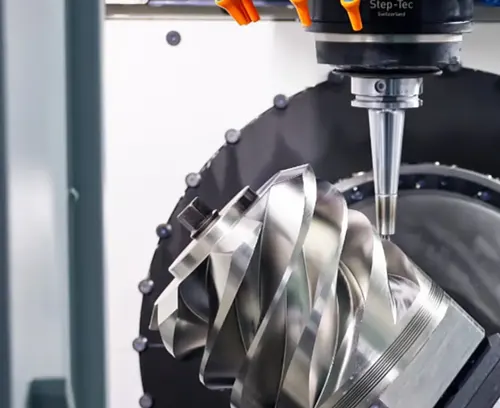
5 Axis CNC Milling
Offer 5-axis machining technology for sophisticated and tightly toleranced parts. Featuring quick processing, it's perfect for elaborate designs.
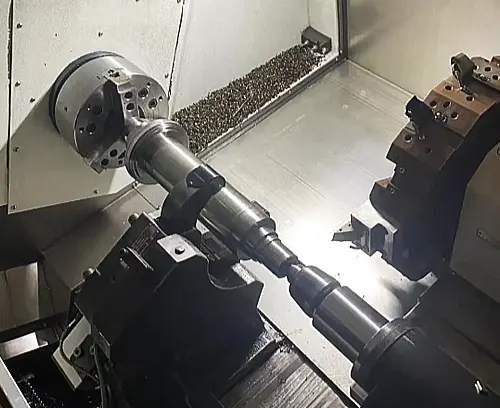
Precision Machining
Execute top-tier machining services by combining several production phases to maximize efficiency, precision, and minimize delays, guaranteeing reliable, high-quality output.
Capabilities
Maximum Dimensions
2000mm x 1500mm x 800mm or 78.7 x 59 x 31.5 inches.
Maximum Dimensions
2000mm x 1500mm x 800mm or 78.7 x 59 x 31.5 inches.
Support Threading
Prefer Metric Threads, Also Support UNC and UNF threads.
Wall Thickness
Generally, a workable minimum wall thickness is 0.5mm for metals and 1.0mm for plastics.
Material Available
Metals: Aluminum, Copper, Brass, Bronze, Stainless Steel, Carbon Steel, Steel Alloy, Titanium, and plastic, etc .
Tolerances
Dimension: Depends on the size and material, generally +/- 0.01mm or 0.0004 inches
Common CNC DFM
The goal of DFM is to make production more cost-effective through smarter design decisions.

Sharp Corner

Undercut

Undercut

Thick Walls

Tolerance Guide

Small Hole

Narrow Area
Metal Materials
We offer instant quotes for over 100 metals and help compare processing material costs.We make it simple to quote 100+ metals and compare how processing costs stack up.
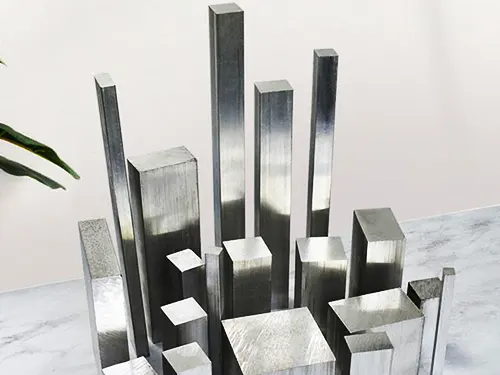
Aluminum
Aluminum is a popular material used in CNC machining due to its lightweight, strong, and corrosion-resistant properties. It is commonly used in various industries such as aerospace, automotive, and electronics for manufacturing a wide range of components. Some common types of aluminum materials used in CNC machining include 6061 aluminum, known for its high strength and versatility; 7075 aluminum, which is extremely strong and commonly used in aircraft applications; and 2024 aluminum, valued for its high resistance to fatigue and easy machinability. Other types of aluminum alloys like 5052, 6063, and 6082 are also frequently utilized in CNC machining for their unique properties and applications in different industries.
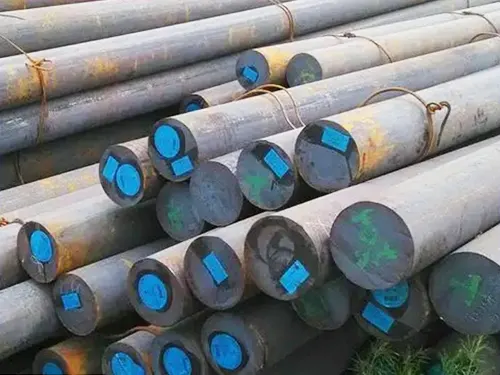
Carbon Steel
Carbon steel is a type of steel that contains primarily carbon and iron. It is a popular choice for CNC machining due to its strength, durability, and affordability. Common types of carbon steel materials used in CNC machining include low carbon steel, medium carbon steel, and high carbon steel. Low carbon steel, also known as mild steel, is easy to machine and weld, making it suitable for a wide range of applications. Medium carbon steel offers higher strength and hardness compared to low carbon steel, while high carbon steel provides even greater strength and wear resistance. Each type of carbon steel has its own unique properties that make it suitable for different machining projects.
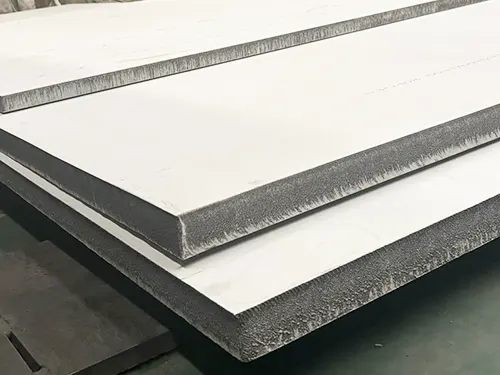
Stainless Steel
Stainless steel is a popular material used in CNC machining due to its durability, corrosion resistance, and strength. It is composed of iron, carbon, chromium, and other alloys, making it ideal for producing high-quality components for various industries. Some common types of stainless steel used in CNC machining are 304, 316, and 17-4. 304 stainless steel is known for its excellent weldability and formability, making it suitable for a wide range of applications. 316 stainless steel is highly corrosion-resistant, making it perfect for components exposed to harsh environments. 17-4 stainless steel is valued for its high strength and heat resistance, making it suitable for aerospace and military applications. Each type of stainless steel has its own unique properties, allowing for versatility in CNC machining processes.
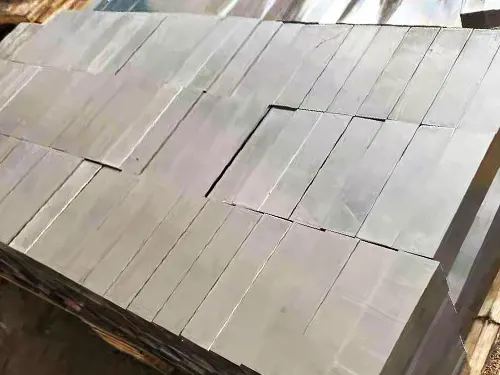
Tool Steel
Tool steel is a type of carbon and alloy steels that are used for making tools used in CNC machining. This material is known for its hardness, resistance to abrasion, and ability to hold a cutting edge. Some common types of tool steel used for CNC machining include D2 tool steel, M2 tool steel, A2 tool steel, O1 tool steel, S7 tool steel, and H13 tool steel. Each type has its own unique properties that make it suitable for different machining applications. D2 tool steel, for example, is often used for making cutting tools due to its high wear resistance, while H13 tool steel is ideal for making injection molds due to its excellent thermal conductivity.
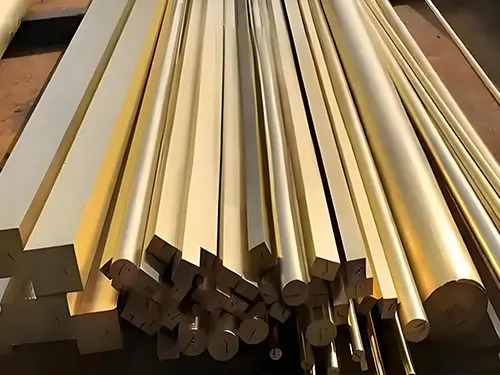
Brass
Brass is a commonly used material in CNC machining due to its excellent machinability and durability. It is a type of alloy made primarily of copper and zinc, with varying proportions of other elements such as lead or tin added to achieve specific properties. Common types of brass used for CNC machining include C260 (cartridge brass) which is known for its excellent cold-working properties, C360 (free-cutting brass) which offers superior machinability, and C464 (naval brass) which is highly resistant to corrosion in marine environments. Brass is often chosen for its aesthetic appeal, as it can be easily polished to a high sheen, making it an ideal material for decorative and functional parts in various industries.
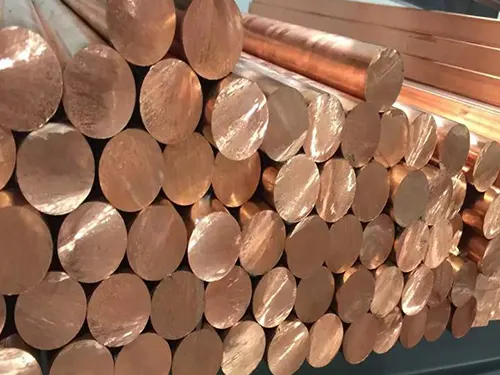
Copper
Cooper is a popular choice for CNC machining due to its excellent machining properties, including good corrosion resistance and high thermal conductivity. Common types of copper materials used in CNC machining include pure copper, brass, bronze, and copper-nickel. Pure copper is ideal for intricate electrical components, while brass is a popular choice for decorative parts due to its gold-like appearance. Bronze, a copper alloy, is known for its strength and durability, making it suitable for bearings and gears. Copper-nickel alloys are commonly used in marine applications due to their resistance to seawater corrosion. Overall, Cooper is a versatile material for CNC machining that offers a combination of durability, conductivity, and aesthetics.
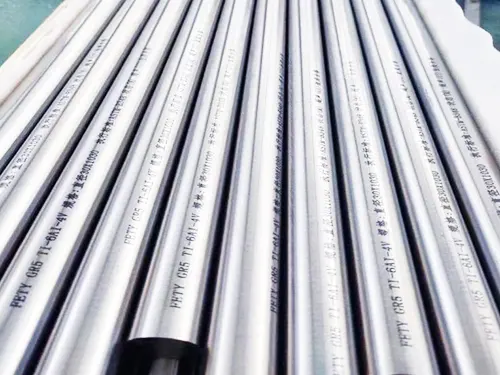
Titanium
Titanium is a popular material used in CNC machining due to its exceptional strength-to-weight ratio, corrosion resistance, and biocompatibility. It is commonly used in industries such as aerospace, medical, and automotive, where precision is crucial. Some common types of titanium materials used in CNC machining include Grade 2, Grade 5 (Ti-6Al-4V), Grade 23 (Ti-6Al-4V ELI), and commercially pure Grade 1. These materials are known for their high strength, durability, and versatility, making them suitable for a wide range of applications. When working with titanium in CNC machining, it is important to consider the material’s properties and characteristics to ensure precise and accurate machining results.
Plastic Materials
We offer instant quotes for over 200 plastics and help compare processing material costs.
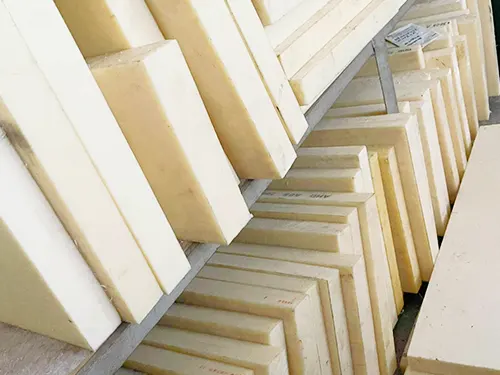
ABS
ABS (Acrylonitrile Butadiene Styrene) is a commonly used thermoplastic in CNC machining. It is known for its high strength and impact resistance, making it ideal for prototyping and end-use parts. One of the main advantages of using ABS in CNC machining is its machinability – it is easy to cut, drill, and mold, resulting in precise and smooth surface finishes. ABS also has good chemical resistance and can withstand high temperatures, making it suitable for a wide range of applications. However, ABS can be prone to warping and shrinkage during the machining process, especially when exposed to temperature changes. It also produces toxic fumes when heated, requiring proper ventilation in the machining environment. Despite these drawbacks, ABS remains a popular choice in CNC machining for its overall versatility and mechanical properties.
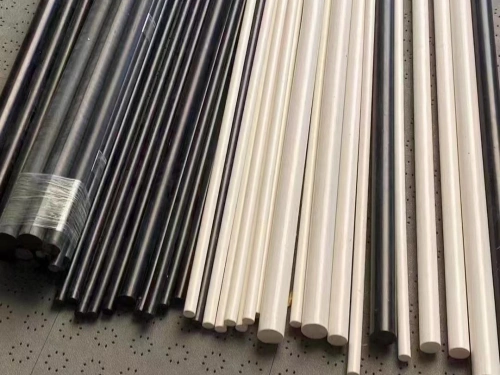
PMMA
PMMA, also known as polymethyl methacrylate or acrylic, is a transparent thermoplastic commonly used in CNC machining for its ease of fabrication and versatility. One of the main advantages of utilizing PMMA for CNC machining is its high optical clarity, making it ideal for applications where transparency is essential. Additionally, PMMA is lightweight, impact resistant, and weather resistant, making it a durable choice for a variety of projects. However, PMMA does have some drawbacks as well. It is prone to scratching and can be brittle, making it more susceptible to cracking under stress compared to other materials. Despite its limitations, PMMA remains a popular choice for CNC machining due to its affordability, machinability, and overall performance.
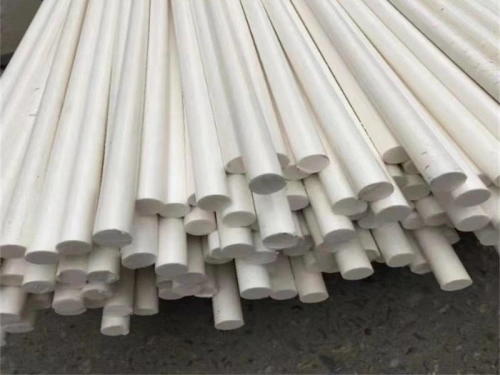
PE
PE or Programmed Endurance for CNC machining is a feature that controls the tool path to extend tool life and improve surface finish. The advantage of using PE is that it can optimize tool paths to reduce wear and tear on cutting tools, resulting in longer tool life and cost savings on tooling. Additionally, it can improve surface finishes by eliminating machining defects that may occur with standard tool paths. However, a disadvantage of PE is that it may increase machining time, as it prioritizes tool longevity and surface finish over speed. Therefore, it is important to weigh the benefits of extended tool life and improved surface finish against the potential increase in machining time when utilizing PE for CNC machining.
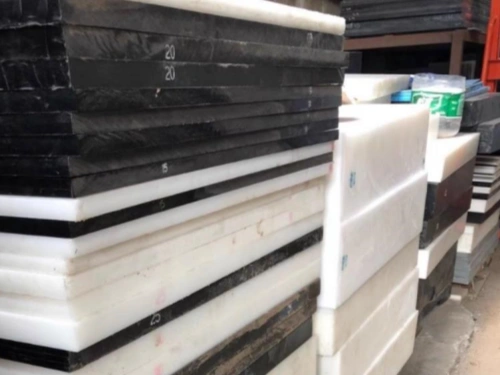
Nylon
Nylon is a popular material used in CNC machining for its versatility and durability. It is a synthetic polymer that is known for its high strength-to-weight ratio, making it ideal for producing lightweight parts with excellent mechanical properties. Nylon also offers good chemical resistance, which allows it to withstand exposure to various solvents and chemicals. In addition, Nylon has a low coefficient of friction, which reduces the wear and tear on cutting tools during the machining process. However, Nylon can be challenging to machine due to its tendency to melt and deform if not properly cooled. It also absorbs moisture easily, which can lead to dimensional instability and affect the overall accuracy of the machining process.
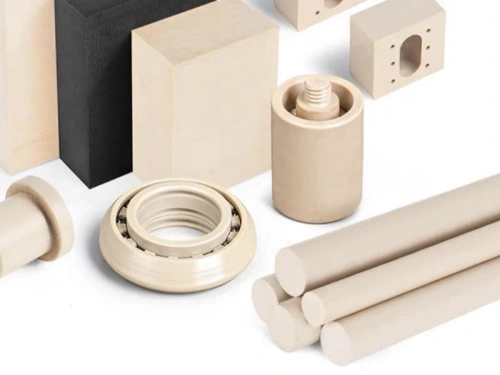
PEEK
PEEK, which stands for Polyetheretherketone, is a high-performance thermoplastic material commonly used in CNC machining due to its excellent mechanical properties and chemical resistance. One of the main advantages of PEEK for CNC machining is its exceptional strength and stiffness, making it suitable for applications requiring high temperature resistance and durability. Additionally, PEEK is lightweight, wear-resistant, and has low moisture absorption properties, making it ideal for a wide range of industries such as aerospace, medical, and automotive. However, PEEK can be challenging to machine due to its high melting point and tendency to warp if not properly controlled. It also comes with a higher price tag compared to other materials, making it less cost-effective for some projects.
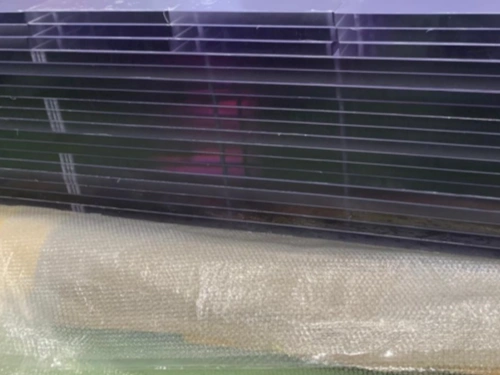
PC
PC for CNC machining, or Personal Computer Numerical Control, refers to the use of a computer to control machine tools and processes in manufacturing. One of the main advantages of using a PC for CNC machining is the ability to easily program and customize the machining process, allowing for greater precision and efficiency. Additionally, PCs can store large amounts of data and programs, making it easier to replicate and modify machining operations. However, there are also drawbacks to using a PC for CNC machining. One disadvantage is the potential for computer crashes or malfunctions, which can disrupt production and lead to costly downtime. Additionally, PCs may require regular maintenance and updates to ensure they are running smoothly and accurately.
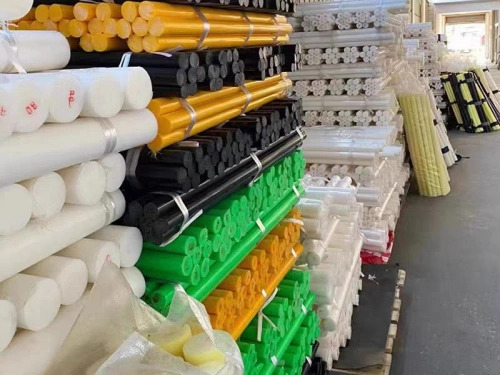
PP
PP, or Polypropylene, is a common material used in CNC machining due to its high impact resistance, good chemical resistance, and relatively low cost. Its advantages include excellent tensile strength, making it suitable for parts that need to withstand mechanical stresses. Additionally, PP is lightweight, making it ideal for applications where weight is a concern. However, one major disadvantage of PP is its poor resistance to UV light, which can cause degradation over time. PP also has a relatively low melting point, which can limit its use in high-temperature applications. Overall, while PP offers many benefits for CNC machining, it is important to consider its limitations when selecting a material for a specific project.
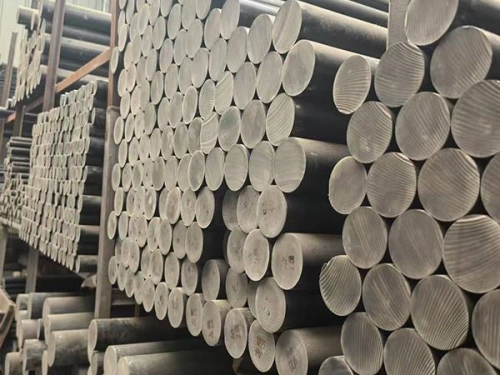
PET
PET, or Polyethylene Terephthalate, is a common material used in CNC machining due to its high strength and durability. One advantage of using PET for CNC machining is its excellent chemical resistance, making it ideal for industrial applications where exposure to harsh chemicals is a concern. Additionally, PET is a lightweight material, making it easy to work with and reducing manufacturing costs. However, a disadvantage of PET is its limited heat resistance, which can lead to deformation or melting if exposed to high temperatures during the machining process. Despite this drawback, PET remains a popular choice for CNC machining due to its versatility and cost-effectiveness.
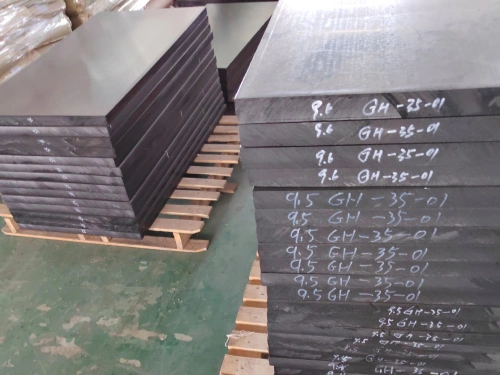
POM
POM, or Precision Optimization Machining, is a technique used in CNC machining to improve the precision and accuracy of the final product. By optimizing the cutting parameters, toolpath strategies, and machine setup, POM allows for a higher level of precision in machining operations. One of the main advantages of POM is the ability to achieve tight tolerances and high surface finishes, making it ideal for industries that require precise components. However, one disadvantage of POM is the increased complexity in programming and setup required to implement the technique effectively. Additionally, the high level of precision achieved with POM can result in longer machining times and higher costs compared to traditional machining methods.
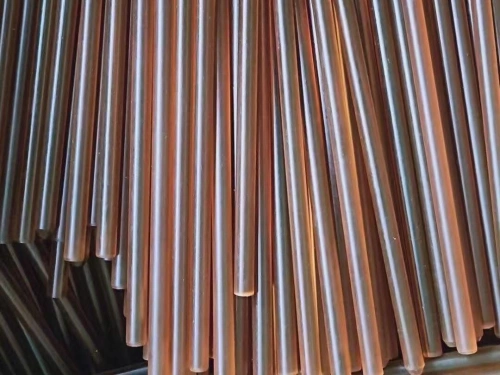
PVC
PVC, or Polyvinyl Chloride, is a popular material used in CNC machining due to its versatility, affordability, and ease of machining. Its advantage lies in its excellent chemical and corrosion resistance, making it suitable for a wide range of applications, including prototypes, fixtures, and even end-use parts. Additionally, PVC has good electrical insulation properties and is lightweight, making it ideal for applications where weight is a concern. However, while PVC is a versatile material, it does have some disadvantages. One major drawback is that it is not as strong or durable as other materials such as metals or engineering plastics, limiting its use in high-stress applications. Additionally, PVC can release toxic fumes when heated, posing a health risk if not properly handled.
Surface Finishes
Surface treatment is our team’s area of expertise, backed by years of hands-on experience.
| Name | Description | Materials | Color | Texture | More |
|---|---|---|---|---|---|
| Brushing | Brushing is a routine oral hygiene practice that involves using a toothbrush to clean teeth and gums. It helps remove plaque, prevent cavities, and maintain overall dental health. Brushing should be done at least twice a day for optimal results. |
Aluminum, Brass, Stainless Steel, Steel, ABS,etc | N/A | Satin | |
| Sand Blast | Sand blasting is a process of forcibly propelling abrasive material against a surface at high pressure to remove contaminants or alter its texture. It is commonly used for cleaning, deburring, or creating a rough surface for paint adhesion. |
All Metal Materials, Plastic | N/A | Matte | |
| Tumbling | Tumbling refers to a form of gymnastics that involves a series of acrobatic movements like flips, somersaults, and twists. It requires strength, flexibility, and coordination to perform these dynamic skills safely. |
All Materials | N/A | Smooth, Matte | |
| Polishing | Polishing is a finishing process used to enhance the appearance of surfaces by smoothing and shining them. It involves using abrasives and polishes to remove imperfections and create a smooth, reflective surface. |
All Materials | N/A | Smooth | |
| Anodizing | Anodizing is an electrolytic passivation process used to increase the thickness of the natural oxide layer on the surface of metal parts. This enhances resistance to corrosion and wear, as well as providing a decorative finish. |
Aluminum, Titanium | Clear, Yellow, Green, Blue, Black, etc |
Smooth, matte finish. | |
| Painting | Painting is a form of visual art where colors and tones are applied to a surface using various tools, such as brushes or knives. It allows artists to express creativity, emotions, concepts, or tell stories through their work. |
All Materials | Clear, Yellow, Green, Blue, Black, Multiple | Gloss, semi-gloss, flat, metallic, textured | |
| Black Oxide | Black oxide is a conversion coating used to provide corrosion resistance and enhance the appearance of metal parts. It creates a dark black finish that is ideal for applications where a decorative or protective surface is needed. |
Steel, Stainless Steel | Black | Smooth, matte | |
| Electroplating | Electroplating is a process used to deposit a layer of metal onto a surface through the application of an electric current. This improves the appearance, corrosion resistance, and durability of the material. |
Aluminum, Steel, Stainless Steel | Gold, Silver, Nickel, Copper, Brass, Zinc, Chrome | Smooth, glossy finish | |
| Powder Coating | Powder coating is a dry finishing process where a fine powder is applied to a surface using electrostatic or compressed air spray equipment. The coated surface is then heated, causing the powder to melt and form a smooth, durable finish. |
Aluminum, Stainless Steel, Steel,etc | Custom | Gloss, matte or semi-gloss | |
| Alodine | Alodine is a chemical conversion coating used on aluminum and other metals to provide corrosion resistance and improve paint adhesion. It also enhances electrical conductivity and can be applied by dipping or spraying. |
Aluminum, Stainess Steel | Clear, Gold | As machined | |
| Passivation | Passivation is a process that is used to remove contaminants and impurities from the surface of a metal in order to protect it from corrosion and increase its resistance to oxidation. |
Stainess Steel | N/A | Matte | |
| Electroless Plating | Electroless plating is a process used to deposit a metal layer onto a substrate without the need for an external power source. It relies on a chemical reaction to achieve uniform coating thickness. |
Metal, Plastic | Gold, Silver, Nickel, Copper, Brass, Zinc, Chrome | Smooth, glossy finish |
Gallery Parts
CNC machining services Locations Near Idaho, USA
Our team of seasoned professionals excels in surface treatment for all types of products.
FAQ
Here, some of the most common questions about CNC machining services for Idaho, USA. ” free to contact us if you have any question.”
FAQs about CNC Machining Services for Idaho in USA
Q: What is CNC machining?
A: CNC machining is a manufacturing process that uses computer-controlled machines to create precision parts and components.
Q: Why choose CNC machining services for Idaho?
A: CNC machining services in Idaho offer high precision, efficiency, and cost-effectiveness for producing custom parts.
Q: What industries can benefit from CNC machining services in Idaho?
A: Industries such as aerospace, automotive, electronics, and medical can benefit from CNC machining services in Idaho.
Q: How can I find a reputable CNC machining service in Idaho?
A: You can search online, ask for recommendations, and check reviews to find a reputable CNC machining service in Idaho.
Q: What materials can be used in CNC machining services for Idaho?
A: Materials such as aluminum, steel, titanium, and plastic can be used in CNC machining services for Idaho.
Q: What are the advantages of using CNC machining services in Idaho?
A: The advantages include high precision, repeatability, fast production turnaround, and cost-effectiveness.
Q: Can CNC machining services in Idaho handle small or large production runs?
A: Yes, CNC machining services in Idaho can handle both small and large production runs efficiently.
Q: How long does it take to complete a CNC machining project in Idaho?
A: The time to complete a CNC machining project in Idaho depends on the complexity and size of the project.
Q: Can I request a quote for CNC machining services in Idaho?
A: Yes, most CNC machining services in Idaho offer free quotes for projects. Simply reach out to them with your requirements.
Q: Are CNC machining services in Idaho environmentally friendly?
A: Yes, CNC machining services in Idaho are environmentally friendly as they produce minimal waste and energy consumption compared to traditional manufacturing methods.
